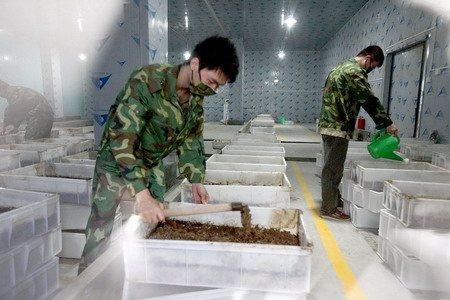Kitchen-waste disposal plant shut down
Villagers' opposition has led to the closing of a pilot kitchen-waste disposal plant in Panyu district of Guangdong's provincial capital.
 |
|
Workers process collected swill at a World EPRD kitchen-waste recycling facility in Panyu district of Guangzhou, capital of Guangdong province on June 6. |
Since opening as the city's first kitchen-waste plant in mid-May, World EPRD collected the waste from 240 volunteer households in Zhong'er village until about a week ago, after residents complained about the stench.
"(Panyu) district leaders held a coordination meeting with the village and the garbage plant, and World EPRD agreed to relocate," village Party secretary Huang Tian told China Daily.
"Opening such a garbage processing plant in a crowded village is unreasonable."
The bins World EPRD had distributed are now stacked in a corner of the plant, inside a gate from which hangs an iron lock.
The plant had collected about 100 kg of garbage daily, using worms and flyblows to compost the waste into fertilizer.
"It's a pity the project stopped soon after it began to show its impact," said a local resident surnamed Yao, from one of the volunteer households in Hailongwan community.
After joining the program, she began separating about 1 kg of kitchen waste from other trash every day, which she placed in a special bin in her residential building that World EPRD workers picked up daily.
"I'm happy I tried it," Yao said. "But since the plant's operations were suspended, I just throw the biodegradable waste in with everything else."
A villager surnamed Zhang, who lives about 200 meters from the plant, said the area has smelled like "rotting fish" since the plant opened.
World EPRD director Duan Delian told local media the company had invested about one million yuan ($147,500) in the plant and did not receive any government subsidies.
"But we can't say the project is a failure," he was quoted as saying.
"Its operations are merely suspended. We're planning to look for an appropriate place in Panyu or even in another Huangpu district."
Duan said the pilot program at least proved garbage classification and biotechnological processing of kitchen waste are practical.
He also expressed hope the local government would issue more favorable policies for such programs.
 0
0 






